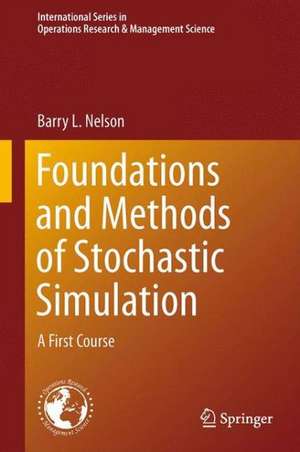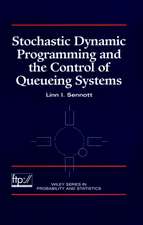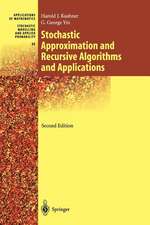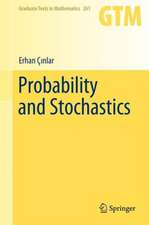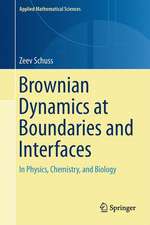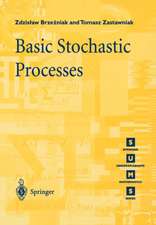Foundations and Methods of Stochastic Simulation: A First Course: International Series in Operations Research & Management Science, cartea 187
Autor Barry Nelsonen Limba Engleză Hardback – 31 ian 2013
The book is a rigorous, but concise treatment, emphasizing lasting principles but also providing specific training in modeling, programming and analysis. In addition to teaching readers how to do simulation, it also prepares them to use simulation in their research; no other book does this. An online solutions manual for end of chapter exercises is also provided.
| Toate formatele și edițiile | Preț | Express |
|---|---|---|
| Paperback (1) | 396.19 lei 38-44 zile | |
| Springer Us – 25 iun 2015 | 396.19 lei 38-44 zile | |
| Hardback (1) | 644.95 lei 43-57 zile | |
| Springer Us – 31 ian 2013 | 644.95 lei 43-57 zile |
Din seria International Series in Operations Research & Management Science
- 20%
 Preț: 331.25 lei
Preț: 331.25 lei - 9%
 Preț: 696.05 lei
Preț: 696.05 lei - 20%
 Preț: 570.61 lei
Preț: 570.61 lei - 18%
 Preț: 1132.02 lei
Preț: 1132.02 lei - 18%
 Preț: 773.72 lei
Preț: 773.72 lei -
 Preț: 170.39 lei
Preț: 170.39 lei - 17%
 Preț: 459.34 lei
Preț: 459.34 lei - 17%
 Preț: 360.47 lei
Preț: 360.47 lei -
 Preț: 263.40 lei
Preț: 263.40 lei - 24%
 Preț: 905.30 lei
Preț: 905.30 lei - 17%
 Preț: 460.08 lei
Preț: 460.08 lei - 17%
 Preț: 459.34 lei
Preț: 459.34 lei - 20%
 Preț: 631.58 lei
Preț: 631.58 lei - 13%
 Preț: 480.00 lei
Preț: 480.00 lei - 18%
 Preț: 738.28 lei
Preț: 738.28 lei - 18%
 Preț: 1225.94 lei
Preț: 1225.94 lei - 18%
 Preț: 948.92 lei
Preț: 948.92 lei - 18%
 Preț: 703.88 lei
Preț: 703.88 lei - 18%
 Preț: 957.44 lei
Preț: 957.44 lei - 15%
 Preț: 651.84 lei
Preț: 651.84 lei - 20%
 Preț: 336.21 lei
Preț: 336.21 lei - 15%
 Preț: 641.03 lei
Preț: 641.03 lei -
 Preț: 404.29 lei
Preț: 404.29 lei - 18%
 Preț: 950.21 lei
Preț: 950.21 lei - 15%
 Preț: 649.06 lei
Preț: 649.06 lei - 18%
 Preț: 725.75 lei
Preț: 725.75 lei -
 Preț: 394.12 lei
Preț: 394.12 lei - 18%
 Preț: 951.47 lei
Preț: 951.47 lei - 15%
 Preț: 639.59 lei
Preț: 639.59 lei - 18%
 Preț: 773.06 lei
Preț: 773.06 lei - 18%
 Preț: 889.29 lei
Preț: 889.29 lei - 15%
 Preț: 655.60 lei
Preț: 655.60 lei - 15%
 Preț: 640.06 lei
Preț: 640.06 lei
Preț: 644.95 lei
Preț vechi: 758.77 lei
-15% Nou
Puncte Express: 967
Preț estimativ în valută:
123.41€ • 129.20$ • 102.11£
123.41€ • 129.20$ • 102.11£
Carte tipărită la comandă
Livrare economică 07-21 aprilie
Preluare comenzi: 021 569.72.76
Specificații
ISBN-13: 9781461461593
ISBN-10: 1461461596
Pagini: 292
Ilustrații: XIV, 276 p.
Dimensiuni: 155 x 235 x 20 mm
Greutate: 0.54 kg
Ediția:2013
Editura: Springer Us
Colecția Springer
Seria International Series in Operations Research & Management Science
Locul publicării:New York, NY, United States
ISBN-10: 1461461596
Pagini: 292
Ilustrații: XIV, 276 p.
Dimensiuni: 155 x 235 x 20 mm
Greutate: 0.54 kg
Ediția:2013
Editura: Springer Us
Colecția Springer
Seria International Series in Operations Research & Management Science
Locul publicării:New York, NY, United States
Public țintă
GraduateCuprins
Why Do We Simulate?.- Simulation Programming: Quick Start.- Examples.- Simulation Programming with VBASim.- Two Views of Simulation.- Simulation Input.- Simulation Output.- Experiment Design and Analysis.- Simulation for Research.- VBASim.
Recenzii
From the reviews:
“The intended audience is graduate and advanced undergraduate students. … The book is clearly written, using a fairly terse style that may please instructors more than students. … its greatest strength is the attention it gives to the modeling process. … can be recommended as a supplement to any simulation course.” (Robert W. Hayden, MAA Reviews, March, 2014)
“The present book consists of 276 pages organised in 9 Chapters. … recommended for MSc, PhD students.” (János Sztrik, zbMATH, Vol. 1266, 2013)
“The intended audience is graduate and advanced undergraduate students. … The book is clearly written, using a fairly terse style that may please instructors more than students. … its greatest strength is the attention it gives to the modeling process. … can be recommended as a supplement to any simulation course.” (Robert W. Hayden, MAA Reviews, March, 2014)
“The present book consists of 276 pages organised in 9 Chapters. … recommended for MSc, PhD students.” (János Sztrik, zbMATH, Vol. 1266, 2013)
Notă biografică
Barry L. Nelson currently serves as the Chair of the Department of Industrial Engineering and Management Sciences at Northwestern, as well as past Editor in Chief of Naval Research Logistics. He has also received an award for the Charles Deering McCormick Professor of Teaching Excellence. Barry Nelson's research is involved with the design and analysis of computer simulation experiments on models of stochastic systems, focusing particularly on issues related to statistical efficiency of simulation experiments. His research includes modeling and analysis of networks of nonstationary queues. The applications of this include computer-performance modeling, manufacturing systems, financial engineering and transportation.
Textul de pe ultima copertă
This graduate-level text covers modeling, programming and analysis of simulation experiments and provides a rigorous treatment of the foundations of simulation and why it works. It introduces object-oriented programming for simulation, covers both the probabilistic and statistical basis for simulation in a rigorous but accessible manner (providing all necessary background material), and provides a modern treatment of experiment design and analysis that goes beyond classical statistics. The book emphasizes essential foundations throughout, rather than providing a compendium of algorithms and theorems, and prepares the reader to use simulation in research as well as practice.
The book is a rigorous but concise treatment, emphasizing lasting principles, but also providing specific training in modeling, programming and analysis. In addition to teaching readers how to do simulation, it also prepares them to use simulation in their research; no other book does this.
The book is a rigorous but concise treatment, emphasizing lasting principles, but also providing specific training in modeling, programming and analysis. In addition to teaching readers how to do simulation, it also prepares them to use simulation in their research; no other book does this.
Caracteristici
Complete graduate text for the one-semester course in Stochastic Simulation Includes end-of-chapter exercises and online solutions manual Author is one of the best-known authorities and teaches the class at Northwestern University Includes supplementary material: sn.pub/extras
Descriere
Descriere de la o altă ediție sau format:
This graduate-level text covers modeling, programming and analysis of simulation experiments and provides a rigorous treatment of the foundations of simulation and why it works. It introduces object-oriented programming for simulation, covers both the probabilistic and statistical basis for simulation in a rigorous but accessible manner (providing all necessary background material); and provides a modern treatment of experiment design and analysis that goes beyond classical statistics. The book emphasizes essential foundations throughout, rather than providing a compendium of algorithms and theorems and prepares the reader to use simulation in research as well as practice.
The book is a rigorous, but concise treatment, emphasizing lasting principles but also providing specific training in modeling, programming and analysis. In addition to teaching readers how to do simulation, it also prepares them to use simulation in their research; no other book does this. An online solutions manual for end of chapter exercises is also be provided.
This graduate-level text covers modeling, programming and analysis of simulation experiments and provides a rigorous treatment of the foundations of simulation and why it works. It introduces object-oriented programming for simulation, covers both the probabilistic and statistical basis for simulation in a rigorous but accessible manner (providing all necessary background material); and provides a modern treatment of experiment design and analysis that goes beyond classical statistics. The book emphasizes essential foundations throughout, rather than providing a compendium of algorithms and theorems and prepares the reader to use simulation in research as well as practice.
The book is a rigorous, but concise treatment, emphasizing lasting principles but also providing specific training in modeling, programming and analysis. In addition to teaching readers how to do simulation, it also prepares them to use simulation in their research; no other book does this. An online solutions manual for end of chapter exercises is also be provided.
